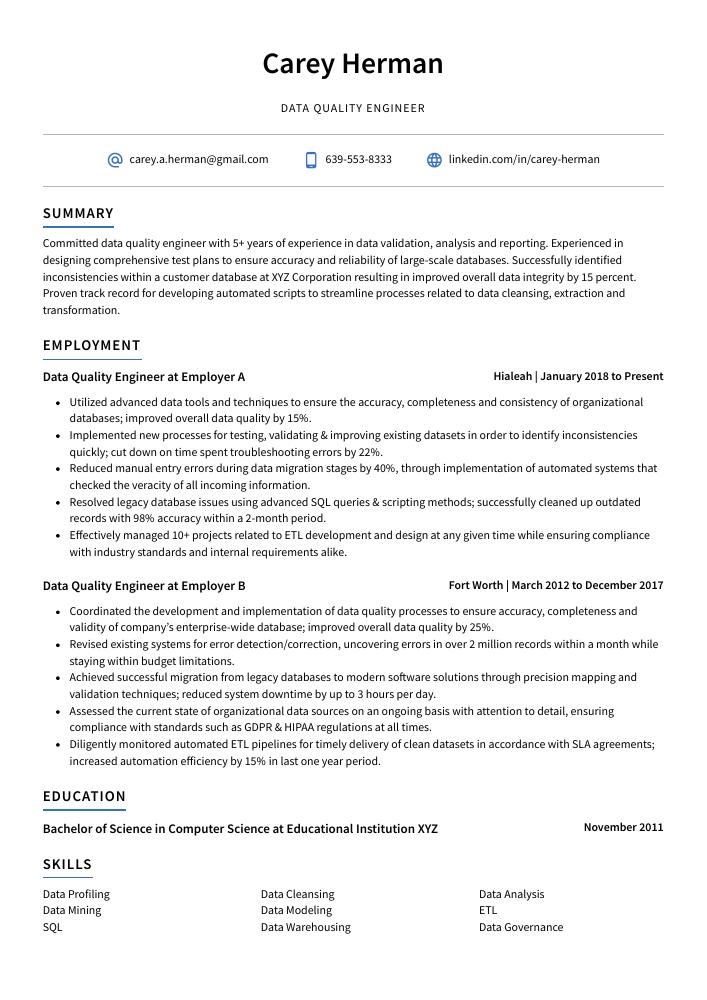Data Quality Engineer Resume Guide
Data Quality Engineers are responsible for ensuring the accuracy and consistency of data in an organization. They develop processes to measure, monitor, and improve data quality across systems, analyze metrics related to data integrity, identify areas where improvements can be made, implement new methods for validating incoming information and create reports on any issues or trends they discover.
Data accuracy and precision is your forte, but hiring managers won’t know that unless you prove it to them. To make sure they’re aware of your data quality engineering skills, you must write a resume that stands out from the crowd.
This guide will walk you through the entire process of creating a top-notch resume. We first show you a complete example and then break down what each resume section should look like.
Table of Contents
The guide is divided into sections for your convenience. You can read it from beginning to end or use the table of contents below to jump to a specific part.
Data Quality Engineer Resume Sample
Carey Herman
Data Quality Engineer
carey.a.herman@gmail.com
639-553-8333
linkedin.com/in/carey-herman
Summary
Committed data quality engineer with 5+ years of experience in data validation, analysis and reporting. Experienced in designing comprehensive test plans to ensure accuracy and reliability of large-scale databases. Successfully identified inconsistencies within a customer database at XYZ Corporation resulting in improved overall data integrity by 15 percent. Proven track record for developing automated scripts to streamline processes related to data cleansing, extraction and transformation.
Experience
Data Quality Engineer, Employer A
Hialeah, Jan 2018 – Present
- Utilized advanced data tools and techniques to ensure the accuracy, completeness and consistency of organizational databases; improved overall data quality by 15%.
- Implemented new processes for testing, validating & improving existing datasets in order to identify inconsistencies quickly; cut down on time spent troubleshooting errors by 22%.
- Reduced manual entry errors during data migration stages by 40%, through implementation of automated systems that checked the veracity of all incoming information.
- Resolved legacy database issues using advanced SQL queries & scripting methods; successfully cleaned up outdated records with 98% accuracy within a 2-month period.
- Effectively managed 10+ projects related to ETL development and design at any given time while ensuring compliance with industry standards and internal requirements alike.
Data Quality Engineer, Employer B
Fort Worth, Mar 2012 – Dec 2017
- Coordinated the development and implementation of data quality processes to ensure accuracy, completeness and validity of company’s enterprise-wide database; improved overall data quality by 25%.
- Revised existing systems for error detection/correction, uncovering errors in over 2 million records within a month while staying within budget limitations.
- Achieved successful migration from legacy databases to modern software solutions through precision mapping and validation techniques; reduced system downtime by up to 3 hours per day.
- Assessed the current state of organizational data sources on an ongoing basis with attention to detail, ensuring compliance with standards such as GDPR & HIPAA regulations at all times.
- Diligently monitored automated ETL pipelines for timely delivery of clean datasets in accordance with SLA agreements; increased automation efficiency by 15% in last one year period.
Skills
- Data Profiling
- Data Cleansing
- Data Analysis
- Data Mining
- Data Modeling
- ETL
- SQL
- Data Warehousing
- Data Governance
Education
Bachelor of Science in Computer Science
Educational Institution XYZ
Nov 2011
Certifications
Certified Data Quality Manager
International Association for Information and Data Quality (
May 2017
1. Summary / Objective
A resume summary for a data quality engineer should be written to capture the attention of potential employers. It should highlight your experience in developing and implementing data quality processes, as well as any certifications or awards you have received related to this field. You can also mention specific tools and techniques you are proficient with, such as SQL queries, ETL pipelines, or machine learning algorithms. Finally, it is important to emphasize how your work has helped improve customer satisfaction or business operations at previous companies.
Below are some resume summary examples:
Energetic data quality engineer with 9+ years of experience in data mining, analysis, and cleansing. Expertise in SQL queries and developing ETL/ELT processes to ensure accuracy of enterprise-level data sets. Proven track record for increasing customer satisfaction by 83% through implementation of automated testing solutions that reduced manual effort by 75%. Seeking to join ABC Tech as a Data Quality Engineer and apply my expertise towards the company’s success.
Well-rounded Data Quality Engineer with 5+ years of experience in developing, monitoring and maintaining data quality processes. Experienced in using ETL tools to collect, analyze, clean and integrate large datasets from multiple sources. Expertise includes designing automated tests for verifying the integrity of data across platforms. Proven track record of identifying issues quickly and providing solutions that improve overall accuracy and efficiency.
Diligent data quality engineer with 5+ years of experience in validating, analyzing and improving data accuracy across multiple systems. Skilled at using SQL to monitor trends, detect anomalies, develop reports and identify opportunities for improvement. Experienced in identifying root causes of problems quickly and efficiently. Proven track record of successfully implementing solutions that improve data quality by up to 50%.
Proficient data quality engineer with 5+ years of experience in data validation, ETL design and development, analytics, and report automation. Adept at developing robust test plans to ensure maximum accuracy of customer-facing datasets. Looking to join ABC Tech as a Data Quality Engineer where I can utilize my expertise in SQL scripting and database administration to improve the integrity of their data products.
Talented data quality engineer with 6+ years of experience building data pipelines, managing datasets and creating robust systems to ensure accuracy. Seeking to join ABC Tech as their resident data quality expert in order to help the company meet its business objectives by developing high-quality solutions that drive customer satisfaction. Proven track record of increasing data integrity from 90% to 99%.
Reliable and experienced data quality engineer with 5+ years of experience in developing, implementing and monitoring data quality standards across a range of industries. At XYZ Corporation, created an automated system for acquiring and validating customer information which resulted in improved accuracy by 25%. Passionate about providing high-quality data solutions to ensure compliance with regulations.
Driven data quality engineer with 5+ years of experience in the financial industry. Expertise in data analytics and problem-solving to improve data accuracy, integrity, security, and availability for a variety of clients. At XYZ Corporation increased performance by 20% through automation initiatives while reducing manual tasks by 50%. Seeking to help ABC Tech maximize the value of their data assets.
Seasoned Data Quality Engineer with 8+ years of experience in data analysis, engineering design and implementation. Proven track record of developing successful strategies to ensure the accuracy, completeness, reliability and timeliness of data. Seeking a role at ABC Tech to leverage extensive knowledge in database architecture and data modeling for the continual improvement of their services.
2. Experience / Employment
For the experience section, you should list your employment history in reverse chronological order, with the most recent role at the top.
When describing what you did for each job, use bullet points and provide as much detail as possible. This allows the reader to quickly take in all that information without getting overwhelmed. You also want to include any quantifiable results of your work when applicable.
For example, instead of saying “Performed data quality checks,” you could say, “Implemented automated data validation processes which resulted in a 90% reduction in manual checking time.”
To write effective bullet points, begin with a strong verb or adverb. Industry specific verbs to use are:
- Analyzed
- Monitored
- Evaluated
- Assessed
- Investigated
- Resolved
- Documented
- Implemented
- Optimized
- Automated
- Streamlined
- Reconciled
- Enforced
- Validated
Other general verbs you can use are:
- Achieved
- Advised
- Compiled
- Coordinated
- Demonstrated
- Developed
- Expedited
- Facilitated
- Formulated
- Improved
- Introduced
- Mentored
- Participated
- Prepared
- Presented
- Reduced
- Reorganized
- Represented
- Revised
- Spearheaded
- Structured
- Utilized
Below are some example bullet points:
- Facilitated the data quality review process of over 1,500 datasets and established a framework to ensure the accuracy of all incoming data.
- Spearheaded an initiative that improved customer experience by substantially reducing errors in collected data by 30%.
- Substantially decreased manual effort required for daily ETL operations through developing automated scripts using Python and SQL programming language; saving 10 hours each week on average.
- Streamlined existing processes related to analysis, validation and cleansing of large-scale databases while ensuring compliance with internal guidelines regarding data integrity standards across various departments within the organization.
- Automated the generation of reports for senior management which resulted in increased efficiency and saved $1500+ in labor costs per quarter on report production alone.
- Meticulously monitored and evaluated data quality across multiple databases, ensuring that the accuracy of information was maintained at all times; identified and resolved any inconsistencies within 48 hours.
- Participated in a wide range of projects to analyze various data sources for completeness, correctness, accuracy & consistency as well as identify gaps in existing processes/systems and recommend solutions accordingly.
- Investigated customer complaints regarding incorrect or incomplete records to determine root cause and implemented corrective actions resulting in an improved satisfaction rate of 20%.
- Improved overall operational efficiency by developing innovative tools & techniques aimed at streamlining manual tasks such as removing duplicate entries from databases; cut down on average processing time by 30%.
- Structured complex datasets into organized formats suitable for automated analysis via advanced software programs such PowerBI, Tableau etc., boosting productivity by 40% while reducing error rates significantly (down 16%).
- Consistently monitored and enhanced data quality across a range of projects, resulting in an 8% improvement in accuracy.
- Monitored database systems to ensure compliance with established standards; identified and rectified errors within 24 hours, reducing data losses by 10%.
- Documented database processes for maintenance & archiving purposes; documented over 100 reports accurately during the last quarter alone.
- Demonstrated expertise in MS SQL Server Management Studio (SSMS) for managing databases, queries design & implementation; reduced query execution time by 20 minutes on average per project.
- Validated new databases against existing ones prior to launch, ensuring that all requirements were met before going live; successfully validated 5+ projects every month with 0 defects reported after deployment.
- Compiled and maintained data integrity; monitored and improved data quality across multiple databases, resulting in a 10% reduction of errors.
- Actively identified discrepancies between existing records and source systems, rectifying them to ensure accuracy with minimal impact on system performance.
- Reorganized large datasets for easier accessibility, improving the efficacy of reporting processes by 50%.
- Expedited the development process by proactively providing solutions to complex technical issues related to database management & optimization techniques.
- Enforced appropriate standards set forth by organizational policy while performing regular audits and reviews on stored information; achieved 100% compliance within allocated timeline frames consistently over 3 years.
- Advised on data quality initiatives for 4 major projects, leading to a 25% improvement in the accuracy of all customer-facing reports.
- Confidently identified and resolved over 200 technical issues within complex data architectures; eliminated errors from production databases by 85%.
- Formulated comprehensive strategies and protocols that raised overall system performance levels by 15%, while reducing manual audit time by 40%.
- Presented findings and solutions to senior management teams on a regular basis, resulting in increased trust & collaboration across departments.
- Prepared detailed documentation pertaining to all data cleansing activities, ensuring compliance with industry standards at all times.
- Reconciled data discrepancies in over 500 client records, resulting in a 10% decrease of errors and improved data accuracy.
- Introduced a new set of automated testing procedures to detect inaccuracies within customer databases; achieved 95% success rate across all tests.
- Thoroughly analyzed quality assurance reports for multiple projects, identified potential issues with data entry processes and provided solutions that brought about an 80% improvement in process efficiency rates.
- Represented the company at various industry conferences as an expert on data integrity initiatives; shared best practices among peers from other organizations which helped secure 5 major contracts worth $1 million each year-on-year.
- Mentored junior team members on complex coding techniques related to accurate database management systems (DBMS), ensuring adherence to industry standards while decreasing development timeframes by 25%.
- Reliably monitored data accuracy and integrity of more than 300 databases, ensuring that all information was complete and up-to-date; reduced errors in reports by 20%.
- Optimized existing processes for the capture, storage and retrieval of data to ensure maximum efficiency; decreased report processing time by 50% on average.
- Analyzed large volumes of complex structured & unstructured datasets using advanced tools like Python/R programming languages to identify trends in customer behavior over time.
- Evaluated current database systems, identified areas for improvement and created detailed requirement documents detailing desired system changes; saved 40 hours a month in manual reporting activities as a result.
- Developed risk management strategies to mitigate any potential data breaches or other security threats while also designing new protocols for proper document handling procedures with an emphasis on privacy compliance standards such as GDPR & HIPAA requirements.
3. Skills
The skillset employers require in an employee will likely vary, either slightly or significantly; skimming through their job adverts is the best way to determine what each is looking for. One organization may be looking for someone with experience in data cleansing, while another may prioritize knowledge of ETL processes.
It is important to tailor the skills section of your resume to each job you are applying for because many companies use applicant tracking systems these days. These computer programs scan resumes for certain keywords before passing them on to a human.
You should also elaborate on the most relevant ones in other sections such as the summary or experience section – this will help demonstrate how well-suited you are and make it easier for employers to find what they need quickly.
Below is a list of common skills & terms:
- Data Analysis
- Data Cleansing
- Data Governance
- Data Mining
- Data Modeling
- Data Profiling
- Data Visualization
- Data Warehousing
- ETL
- SQL
4. Education
Mentioning your education on your resume will depend on how far along you are in your career. If you just graduated and have no prior experience, include an education section below your resume objective. However, if you have a few years of data quality engineering under your belt, including an education section may not be necessary at all as it could take up valuable space that can be used to showcase more relevant work accomplishments and skillsets.
If the decision is made to include an education section, try to list courses related to the data quality engineer role such as programming languages or database systems that would benefit from being highlighted for potential employers.
Bachelor of Science in Computer Science
Educational Institution XYZ
Nov 2011
5. Certifications
Certifications demonstrate to potential employers that you have been tested and are proficient in a certain field. It is important to include any certifications relevant to the job you are applying for, as it shows your commitment and dedication towards professional development.
Including certifications on your resume can be an effective way of demonstrating that you possess the necessary skills required for the role and will help make you stand out from other applicants.
Certified Data Quality Manager
International Association for Information and Data Quality (
May 2017
6. Contact Info
Your name should be the first thing a reader sees when viewing your resume, so ensure its positioning is prominent. Your phone number should be written in the most commonly used format in your country/city/state, and your email address should be professional.
You can also choose to include a link to your LinkedIn profile, personal website, or other online platforms relevant to your industry.
Finally, name your resume file appropriately to help hiring managers; for Carey Herman, this would be Carey-Herman-resume.pdf or Carey-Herman-resume.docx.
7. Cover Letter
Attaching a cover letter to your job application is a great way to stand out from the competition and make yourself memorable to potential employers. A cover letter typically consists of 2-4 paragraphs that provide more information about who you are as a professional and why you’re an excellent fit for the role.
Although it isn’t always necessary, writing a cover letter can be beneficial in helping recruiters better understand your qualifications and experiences. It also gives them insight into what makes you unique as an applicant and allows you to express your enthusiasm for the position.
Below is an example cover letter:
Dear Laurence,
I am writing to apply for the Data Quality Engineer position at XYZ Company. With experience in data mining, analysis, and quality assurance, as well as a strong background in programming and database development, I believe I would make an excellent addition to your team.
In my current role as a Data Analyst at ABC Corporation, I am responsible for conducting data mining and analysis to support business decision making. I have also developed and implemented several quality assurance procedures that have resulted in improved data accuracy and completeness. In addition, my programming skills have allowed me to develop custom scripts and applications to automate various tasks related to data collection and processing.
I am confident that I can bring the same level of skill and dedication to the Data Quality Engineer position at XYZ Company. My experience with data mining, analysis, quality assurance, and programming will enable me to contribute immediately to your organization’s success. I look forward to speaking with you about this opportunity soon.
Sincerely,
Carey
Data Quality Engineer Resume Templates
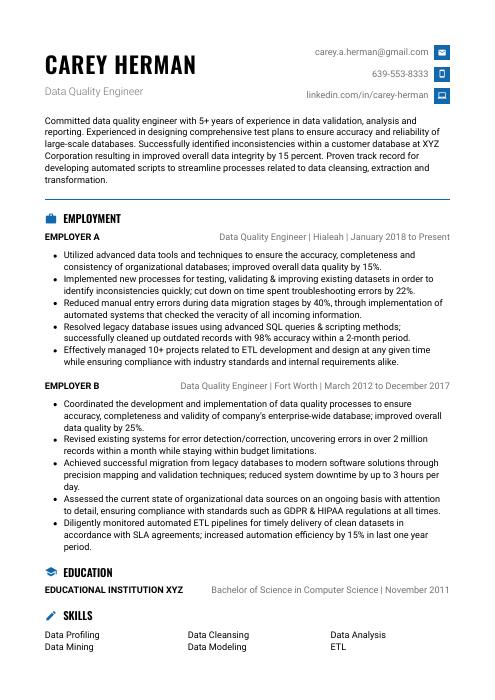 Echidna
Echidna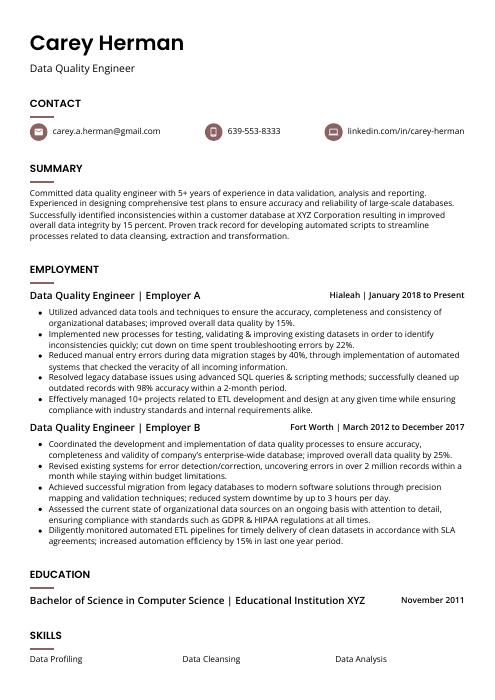 Fossa
Fossa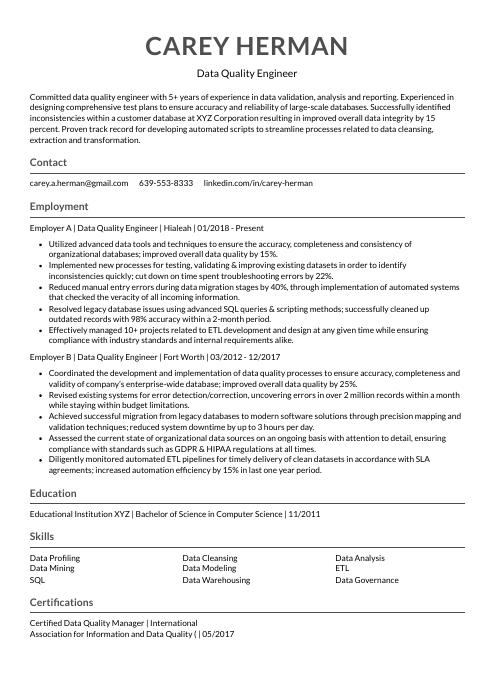 Indri
Indri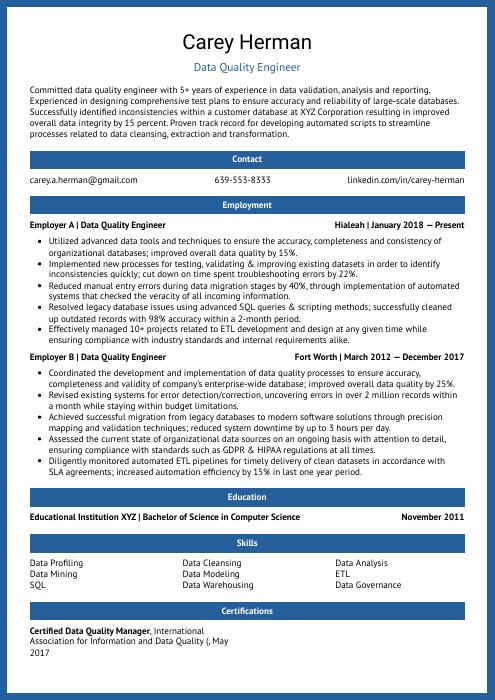 Ocelot
Ocelot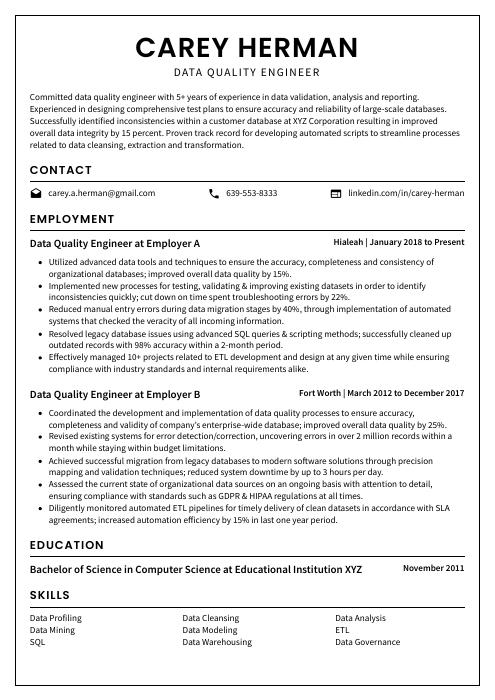 Cormorant
Cormorant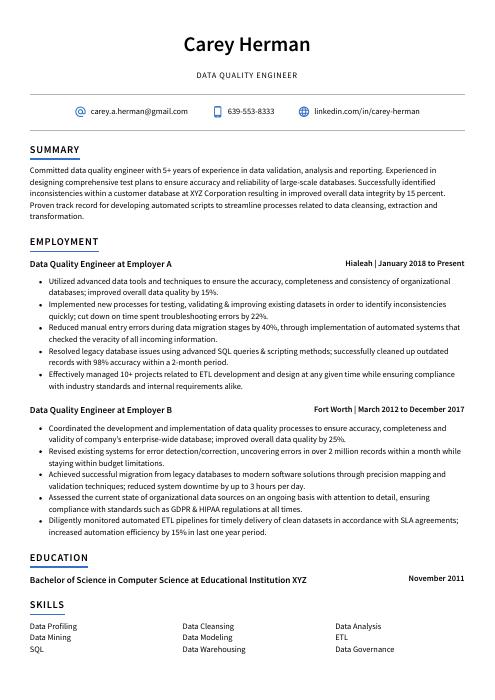 Axolotl
Axolotl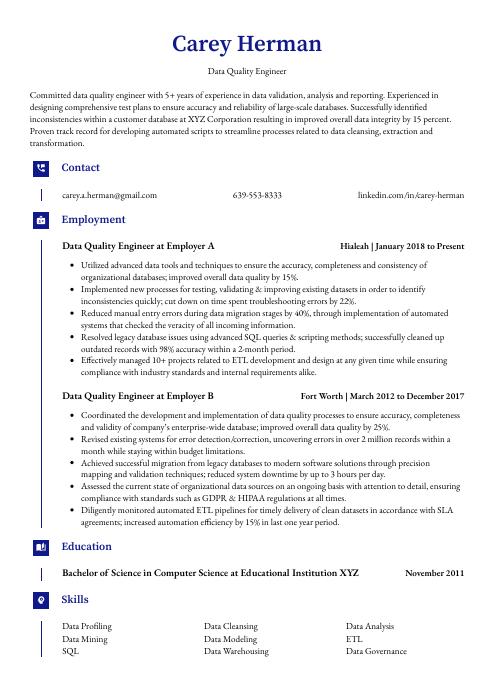 Gharial
Gharial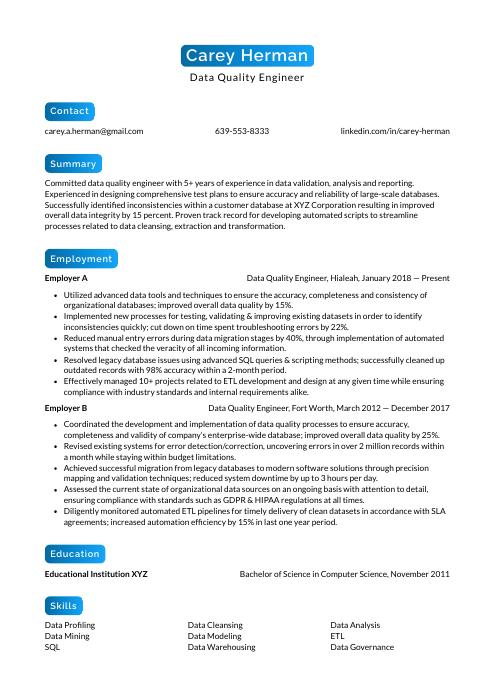 Kinkajou
Kinkajou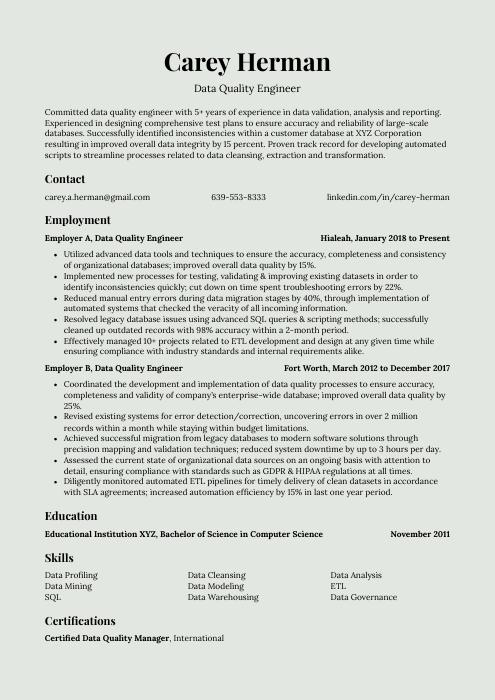 Saola
Saola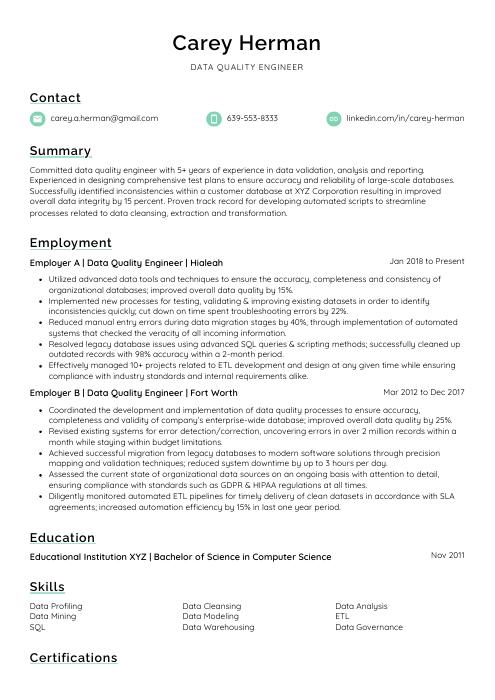 Lorikeet
Lorikeet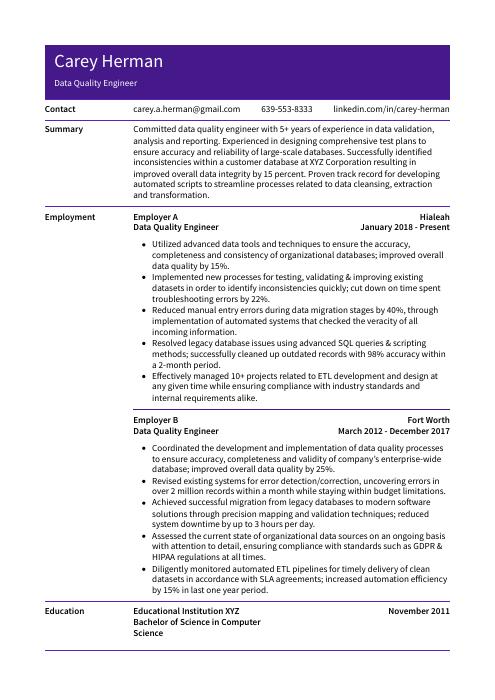 Pika
Pika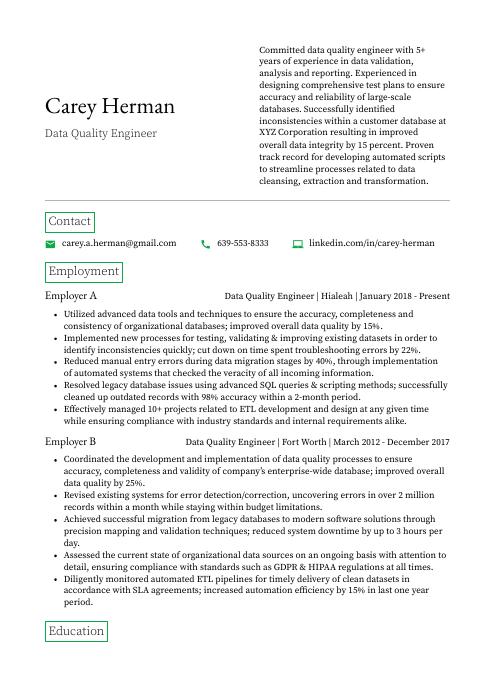 Quokka
Quokka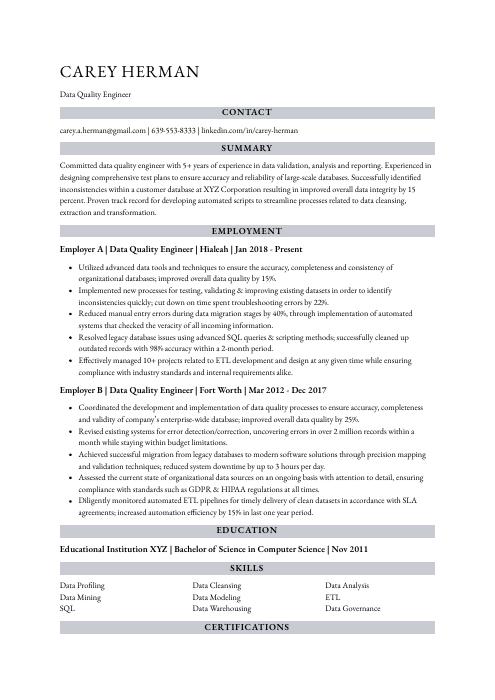 Numbat
Numbat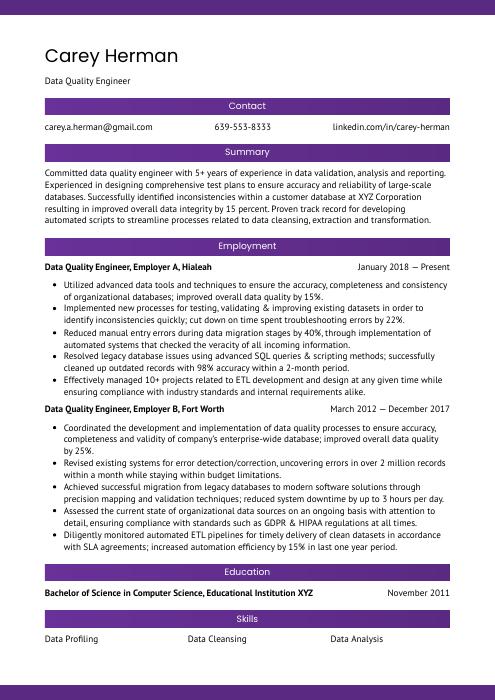 Jerboa
Jerboa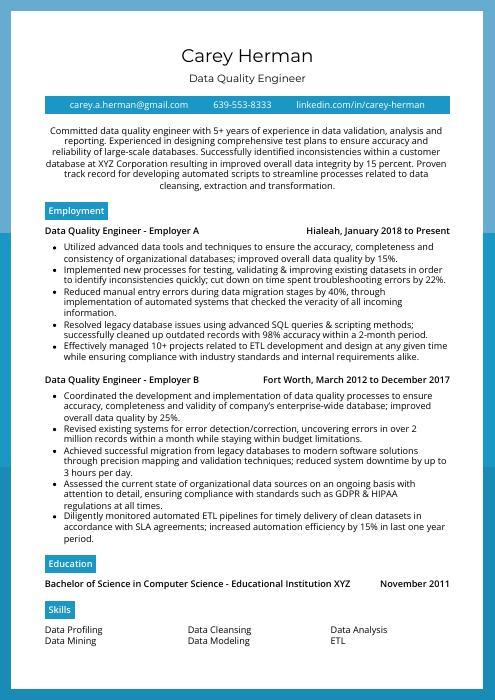 Rhea
Rhea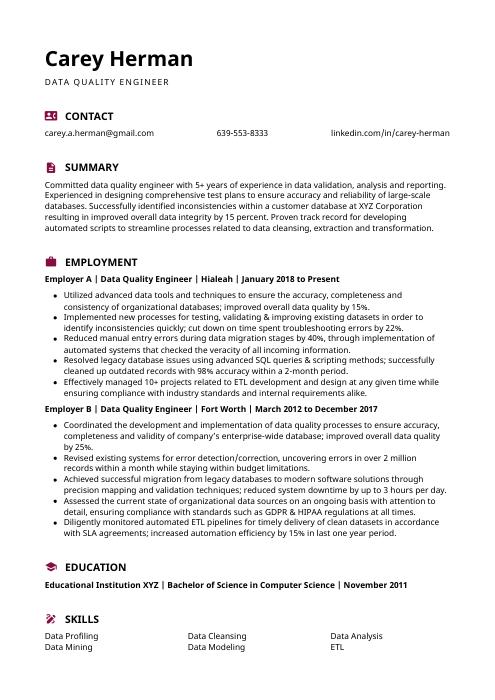 Hoopoe
Hoopoe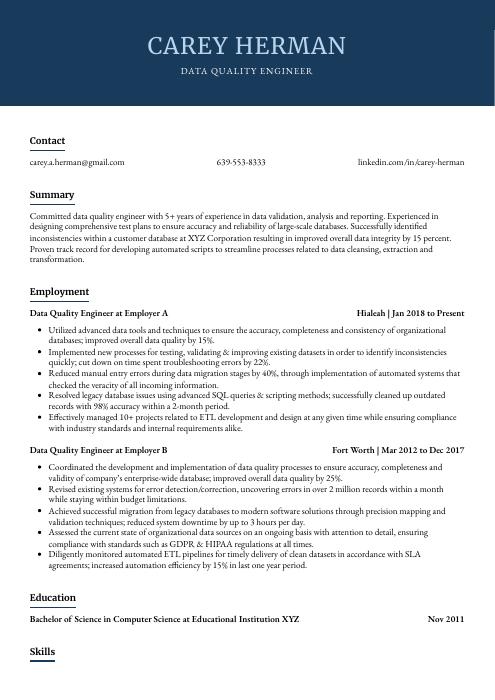 Bonobo
Bonobo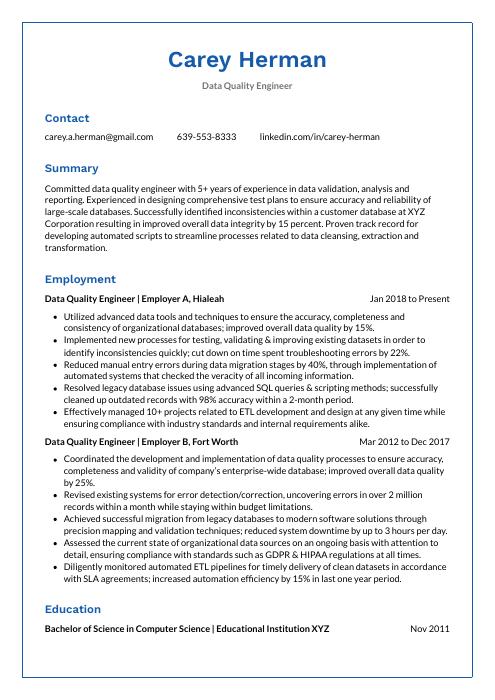 Markhor
Markhor Rezjumei
Rezjumei
